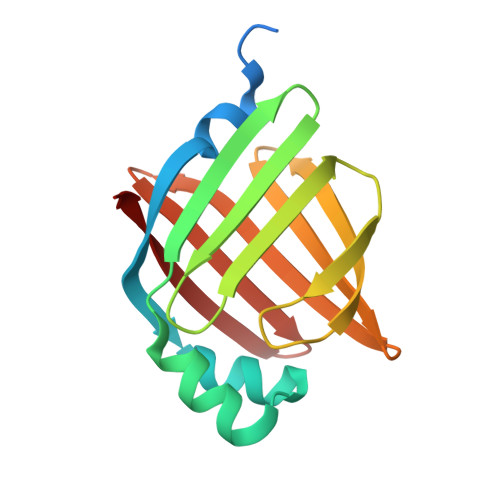From hit to lead: Structure-based discovery of naphthalene-1-sulfonamide derivatives as potent and selective inhibitors of fatty acid binding protein 4
Gao, D.D., Dou, H.X., Su, H.X., Zhang, M.M., Wang, T., Liu, Q.F., Cai, H.Y., Ding, H.P., Yang, Z., Zhu, W.L., Xu, Y.C., Wang, H.Y., Li, Y.X.(2018) Eur J Med Chem 154: 44-59
- PubMed: 29775936
- DOI: https://doi.org/10.1016/j.ejmech.2018.05.007
- Primary Citation of Related Structures:
5Y0F, 5Y0G, 5Y0X, 5Y12, 5Y13 - PubMed Abstract:
Fatty acid binding protein 4 (FABP4) plays a critical role in metabolism and inflammatory processes and therefore is a potential therapeutic target for immunometabolic diseases such as diabetes and atherosclerosis. Herein, we reported the identification of naphthalene-1-sulfonamide derivatives as novel, potent and selective FABP4 inhibitors by applying a structure-based design strategy. The binding affinities of compounds 16dk, 16do and 16du to FABP4, at the molecular level, are equivalent to or even better than that of BMS309403. The X-ray crystallography complemented by the isothermal titration calorimetry studies revealed the binding mode of this series of inhibitors and the pivotal network of ordered water molecules in the binding pocket of FABP4. Moreover, compounds 16dk and 16do showed good metabolic stabilities in liver microsomes. Further extensive in vivo study demonstrated that 16dk and 16do exhibited a dramatic improvement in glucose and lipid metabolism, by decreasing fasting blood glucose and serum lipid levels, enhancing insulin sensitivity, and ameliorating hepatic steatosis in obese diabetic (db/db) mice.
Organizational Affiliation:
School of Pharmacy, Fudan University, Shanghai 201203, China.















